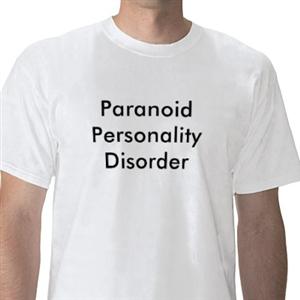
At Age of Treason, last March an interesting debate ensued when the admin expelled a regular commenter (no ellipsis added between unquoted sentences):
Tanstaafl said…
Daybreaker, I get the distinct impression you are in some way jewish. Would you mind setting the record straight, one way or the other?
Daybreaker said…
I’m not Jewish.
My personal background is not your business, and I’m not going to share it on the Internet, but I’ve been looking it up and I’m definitely not Jewish.
Your “distinct impression” lacks any foundation. The quote you gave just before saying you have this “distinct impression” (“Our default setting is highly universalistic compared to Jews, and likely compared to anybody else” [–Daybreaker]) is not a rational basis for an impression that I’m Jewish in any way.
Let me be blunt. You’re being paranoid.
Pat Hannagan said…
Well, Tan’s impression is one I got Daybreaker, or at least I questioned.
Your comments in this thread were beautiful but, when I’ve read you elsewhere you seem to me to have flip slopped and taken on the opposition’s side. It’s not paranoia, just trying to work out if you’re legit or not.
Daybreaker said…
I’ve said what I am, minus what particular countries my all-White and all non-Jewish ancestors hail from. And I’ve done what I can to clear up the main points that may cause confusion.
There’s nothing else I can do. I accept that you and Tanstaafl are not being paranoid. But you’ll just have to keep wondering and working on it, because I can’t make myself any plainer than to give you a straight no, which I already have.
Tanstaafl said…
Daybreaker, let me be blunt. Your comments, here and on previous posts, are too long and too many. You seem to be trying to take charge of the discussion, to manage it. Stop it.
That’s one of several indicators that gives me the distinct impression you’re a jew. Calling me paranoid is another. People think you’re a jew because you act like one.
Daybreaker said…
That’s a “shut up” and I will.
But first…
“That’s one of several indicators that gives me the distinct impression you’re a jew. Calling me paranoid is another. People think you’re a jew because you act like one.”
Based on that additional evidence, I retract my retraction. You definitely are paranoid about Jews and imagined Jews.
Tanstaafl said…
You definitely won’t be missed.
Rollory said…
“Daybreaker, let me be blunt. Your comments, here and on previous posts, are too long and too many. You seem to be trying to take charge of the discussion, to manage it. Stop it. That’s one of several indicators that gives me the distinct impression you’re a jew.”
Wow, that’s all it takes to avoid the accusation?
♣
What alarmed me was that other commenters at Age of Treason I respected continued to comment as if Daybreaker’s ethnicity had been properly demonstrated. It looked unfair to me even though I had no means to ascertain if Daybreaker was telling the truth. I felt disappointed and promised to myself, silently, not to comment at that blog again. But…
 Yesterday and today I received some emails from Tanstaafl asking me if I have Jewish blood in my veins! Apparently Tanstaafl is now trying to see a Jew under the wrong stone because he’s extremely upset about my recent posts criticizing his pet theory, “monocausalism.” However upset he may be, that is no excuse for his rudeness in his recent emails. Here there are some sentences of our email exchanges. Originally, he reacted as a result of my comments at Carolyn’s blog:
Yesterday and today I received some emails from Tanstaafl asking me if I have Jewish blood in my veins! Apparently Tanstaafl is now trying to see a Jew under the wrong stone because he’s extremely upset about my recent posts criticizing his pet theory, “monocausalism.” However upset he may be, that is no excuse for his rudeness in his recent emails. Here there are some sentences of our email exchanges. Originally, he reacted as a result of my comments at Carolyn’s blog:
Tanstaafl wrote…
Could you tell me what is going on in your mind? Do you not recognize a criticism of your position? Are you not willing or able to defend it? Did you discover some marrano roots or something?
I replied…
If you don’t mind, I will respond in my blog, but first I must know if it’s OK with you to quote your email.
Tanstaafl replied…
Haven’t you been “responding” at your blog, and elsewhere, for months already? You can’t sum up whatever you have to say to me in an email?
I replied…
I can sum up: as far as I know I have zero J ancestry (a couple of old uncles are pretty obsessed with genealogy and I trust their research). And I am astounded that you may think of me having “marrano” ancestry.
Tanstaafl replied…
Why would this be astounding anyway, then or now? Were you not aware of the marrano element sprinkled throughout latin America?
What is astounding about the question considering this position you’ve taken? Being marrano would help explain it.
Tan
♣
Did Tanstaafl imply that I lied in my previous email when I explicitly said that I have zero Jewish blood? Since I consider his rudeness a personal insult (not only is he apparently doubting my word, marrano also means “pig” in Spanish) now I don’t feel compelled to ask permission to publish his above emails. This said, another clarification is in order. In his last email he also said:
“You seem similarly single-minded in your drive even farther back into Roman history. Naturally I’m curious why excusing the jews has become so important to you, especially when your criticisms are aimed, at least in part, at me.”
Where the hell Tanstaafl got the idea that I am “excusing the jews”? My criticism of monocausalism has nothing to do with defending Jews and everything to do with accusing Whites of weakness—as Severus Niflson explained so well last Monday in Yeager’s show, the subject of my previous entry.
It now looks to me that Tanstaafl is the symmetrical opposite of Fjordman. Just as Fjordman gets mad every time I suggest at Gates of Vienna that Jews have been involved in the West’s crisis, so Tanstaafl gets mad when I suggest at other forums that Whites are involved too in the same crisis. Although Fjordie and Tan are ideological antipodes with regard to the Jewish Question, for them the whole question is “either or”, never—God forbid!—“both.” As Niflson put it in his audio reply to Tanstaafl:
“We can’t just go out there and mention the jews the jews the jews, yeah we can mention other people, but we can’t be childish and just think that it’s all to blame on other people and by magically addressing the issue of their existence that suddenly our character will become magically well.”
Niflson is not alone speaking out about the character flaws of present-day whites. If I wrote for this blog the articles criticizing monocausalism it’s because notable people moved my train of thought toward that direction after Michael O’Meara became disenchanted with the webzine Counter-Currents:
1) Tom Sunic for one has been openly dismissive of monocausalism in his radio podcasts.
2) Michael O’Meara’s best 2011 article at Counter-Currents dismissed monocausalism as something silly and quite stupid.
3) Many of Harold Covington’s radio rants convinced me that, although the subversive Jew must be named, something horribly wrong—“yellow dogs” is one term used by Covington—is going on within the character of today’s Whites.
4) Hunter Wallace has been contradicting monocausalism for at least two years at Occidental Dissent. Although I disagree with his claim that America is run by blacks (I believe that Jews are far more influential) I have quoted some of his recent pronouncements on monocausalism, which Wallace calls “single-cause hypothesis.”
5) The harshest diatribes against these weakened whites I’ve read comes from the pen of William Pierce: one of the best minds that the movement produced in the continent.
6) Even Kevin MacDonald himself doesn’t seem to support strict monocausalism!
The heavyweights convinced me that strict monocausalism is silly, and that besides naming the Jew we must also note our flaws that empowered the tribe since the French Revolution.
Perhaps the next step in Tanstaafl’s escalating paranoia will be to ask these notable people if they too have some Jewish blood—and when receiving answers in the negative then insisting in follow-up emails that they must, notwithstanding, be Jewish?
♣
This is the second time that this happens to me since I became involved in the white nationalist movement by the end of 2009. The first time happened when I criticized the 9/11 conspiracy theories. Monocauslaist J Richards, who even blames the American Civil War on the Jews, claimed at Majority Rights that that alone was proof that I was Jew! (see my comment about it here). Again, since the Majority Rights admin never apologized for allowing Richards’ claim within the main text of an article, I promised never to comment at that site again.
Aside of these insults directed at me by mail and in the blogosphere the real issue is, Are other monocausalists paranoid too?
I would appreciate comments on this question. It seems to me that character flaws are far more endemic in the movement than what I previously thought.
Postscript
When I finished the above writing I learnt that Severus Niflson recorded a follow-up audio response to Tanstaafl even if this time Niflson didn’t name him. At Carolyn’s blog Niflson added a textual reply as well, of which I’ll quote a sentence:
Generally, my point is more on the side of practicality and honesty. The honest truth is that we have plenty of blame for our current situation, we could all make a list. This isn’t to remove blame on other people, but to be reasonable and forthright. Anybody who claims that all of our issues are to be laid on the feet of Jews is basically crossing the line into the realm of religion and faith, which in all honesty isn’t my favorite area since it crosses from rational into emotional.
Listen to Niflson here.